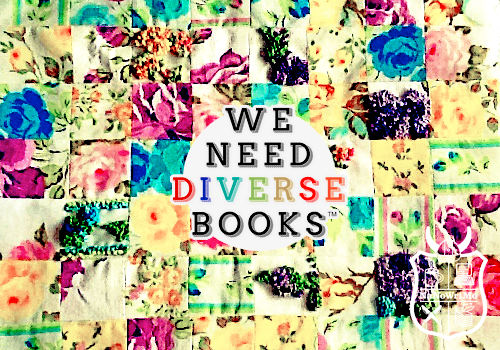We Need Diverse Books: How to Prepare to Write a Diverse Book

Love diversity in your fiction? Support We Need Diverse Books’ Indiegogo campaign!
Throughout October, we’ve partnered with We Need Diverse Books to bring you a series of blog posts full of helpful advice, tips, and suggestions for writing diversity convincingly and respectfully in your fiction—from people who know what they’re talking about. Today, I. W. Gregorio shows you exactly how to prepare to write a diverse book:
So you wanna write a diverse book? Awesome. Great diverse books can change lives. But as Spider-Man taught us: “With great power there must also come great responsibility.”
In her previous post, Ellen Oh quoted the brilliant Gene Luen Yang, who laid down the gospel:
“Make sure you do your homework.”
You can work on this homework at any point in the process, but I personally find it helpful to do it in the earliest stages. Because everybody needs help with their homework sometime, I’ve got five resources for writers researching a diverse book (or any book, for that matter):
Your friends. This seems like a no-brainer, but a surprising number of people are shy about reaching out to people they know. Personally, whenever I’ve tried to speak to people about their areas of experience, whether that be having a gay dad, living in China, or being a social worker, they’ve been flattered by the attention.
Think of your “research” as a way for you to bond with your friend over something that is an integral part of their life. One caveat to this point, though: remember that no one person can give you all the answers. It’s best to get multiple points of view, because there’s diversity within diversity.
Primary sources. Gravitate toward primary sources. And by that I mean, Wikipedia is fine to get an overview, but to really understand a topic, go to the footnotes at the bottom and try your best to find the words of the actual people who lived in Laos, or in Cuba during the Missile Crisis.
For example, I initially hit a stumbling block while writing my debut YA novel, None of the Above, because I first thought to look for books on intersex in the Stanford Medical Library. I learned a lot about intersex anatomy that way, but not a ton about what it was actually like to live as intersex. Then I discovered the Androgen Insensitivity Support Group and found an amazing cache of essays written by women with AIS. These primary sources were invaluable tools that allowed me to get in the head of my main character.
The Internet. If you need a place to start, DiversifYA.com is a one-of-a-kind resource run by We Need Diverse Books executive committee member Marieke Nijkamp, and is an amazing collection of interviews & round tables tagged by type of diversity. They also run occasional Twitter chats.
Additional diversity specific links:
CBC Diversity’s Resources for Writers - a fantastic compendium of essays for people writing diverse books
Malinda Lo’s guide to avoiding LGBTQ stereotypes
Mitali Perkins’ checklist for writers writing about race
Disability in Kidlit - interviews, discussions and reviews
Diversity in YA - celebrating all kinds of diversity in YA
Crowd-sourcing. Don’t be afraid to crowdsource to find people to tweet and exchange e-mails with. Better yet, talk to them by phone or by Skype.
Knowing how people of a certain culture speak—the cadence of their voices, their subtle nuances of syntax—can make the difference between a clunky characterization and one that sings. A good example of this is Patricia McCormick’s Never Fall Down, which captures the voice of a Cambodian refugee perfectly.
Other tips
If your story is set in a culture different than your own, consider traveling to the country to soak in the cuisine, hear the language and live in their world (if you can afford this, of course).
Watch news footage and documentaries. Again, focus on primary sources. You can also look for movies that have specifically shot on location.
Google Maps can give you physical details that you can layer into your novel .
One of the best things about writing as opposed to, say, surgery, is that you have numerous opportunities to get it right. There is no limit to how much homework you can do in the service of your story. And trust me… your story will be the better for it.
I. W. Gregorio is a practicing surgeon by day, masked avenging YA writer by night. After getting her MD, she did her residency at Stanford, where she met the intersex patient who inspired her debut novel, None of the Above. She is a founding member of We Need Diverse Books™ and serves as its VP of Development. A recovering ice hockey player, she lives in Pennsylvania with her husband and two children. Find her on Twitter, Tumblr, Facebook, and Instagram.

We Need Diverse Books (WNDB) is a grassroots nonprofit organization created to address the lack of diverse, non-majority narratives in children’s literature. WNDB is committed to the ideal that embracing diversity will lead to acceptance, empathy, and ultimately equality.
WNDB has launched its inaugural Indiegogo campaign to support its future initiatives, including a Diversity in the Classroom program, diverse author grants and awards, and the first ever Diversity Festival in 2016. Volunteer & sign up for its mailing list at diversebooks.org, or follow WNDB on Twitter, Tumblr, Facebook, and Instagram!
Top photo by Flickr user Nesha’s Vintage Niche.
Chris Baty's Blog
- Chris Baty's profile
- 63 followers




